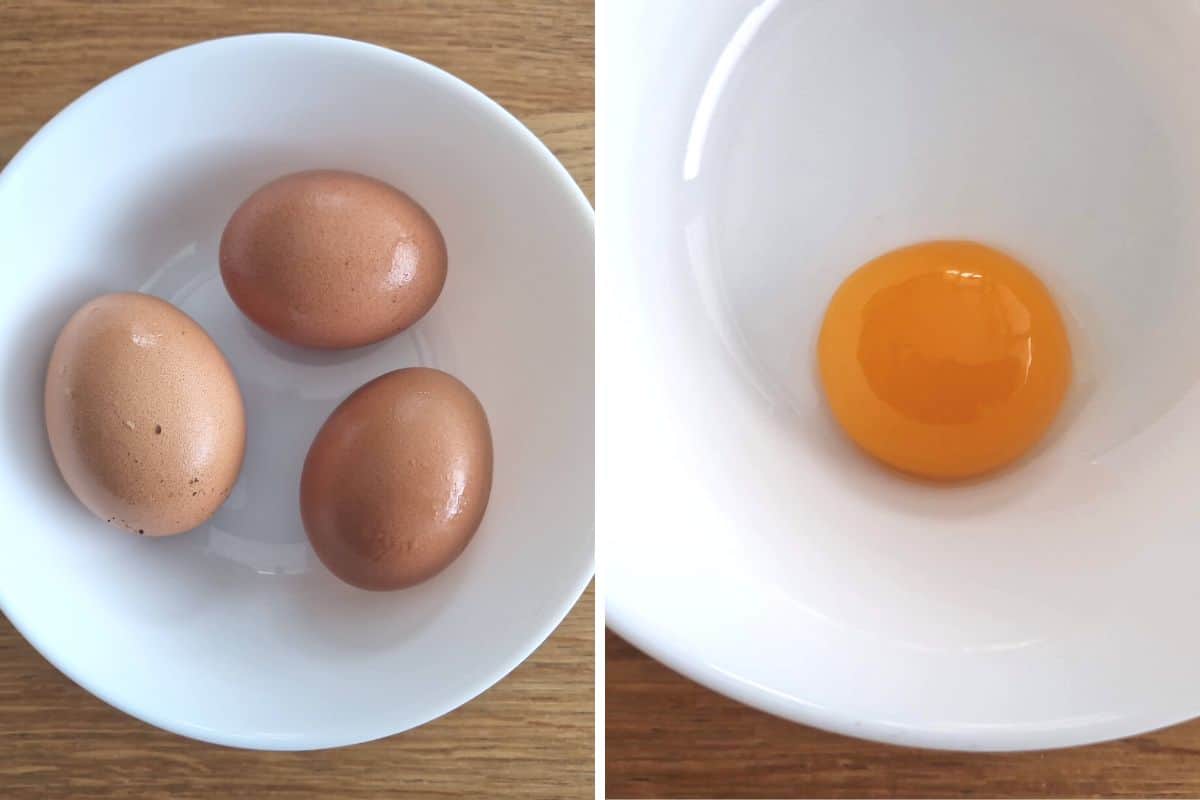If you’re like me, you love to bake. However, from time to time, the recipe may call for egg yolks only and I wonder:
Can you use whole eggs instead of just the egg yolk? And, what would the difference in outcome be if I did that?
The yolk of the egg is used in a recipe for two reasons: its emulsifying abilities and the fat content. The reason for this is that a whole egg does not have the emulsifying ability of just the egg yolk. However, the whole egg is an excellent binding agent. Especially in baked goods such as cookies and cakes. The yolk gives baked goods a velvet texture and a very rich flavor.
Can I use whole eggs instead of just yolks
It’s possible to use the whole egg in a recipe as opposed to only using the yolk. But the effects on the final product may not quite be the same. On the positive side, you will be getting the good properties of both the yolk and egg white when using the whole egg.
However, certain recipes call for using egg yolk only. In these cases, it’s best to stick to the recipe as the egg yolk plays a very specific part in the recipe that cannot be substituted by using the whole egg. Some examples include:
- Hollandaise sauce
- Creme brulee
The different parts of an egg
Eggs are a versatile ingredient when it comes to baking. In this article, we will look at the different parts of the egg, how these parts function, and what the effect is on baking.
An egg is made up of different structures. These may include membranes, the albumen or white of the egg which consists of the outer and inner thin albumen and the thick albumen, as well as the shell of the egg.
An egg is made up of two distinct parts:
- The yellow yolk in the center of the egg
- The watery, protein filled white part of the egg, also refereed to as the egg white
When focusing on the egg white, you may have noticed that I mention the thick albumen of the egg and the thin inner and outer albumen of the egg white.
The next time you crack an egg open in a pan, pay attention to the egg white. It’s much thicker around the yolk of the egg and becomes much thinner, almost watery toward the edges.
The whole egg
Let’s take a quick look at the contents of a whole egg:
- 73% water
- 13% protein
- 2% minerals
- 12% fat
Whole eggs in baked goods help to give structure to the final product due to the proteins that coagulate with starches in the recipe. In addition, the whole egg will add moisture to the final product due to its high water content.
The egg yolk
The yolk acts as an emulsifier by combining the fat and water in the recipe. The yolk in a recipe will give you to form a thick and luscious batter with a beautiful texture. In addition, the yolk of the egg will add more nutritional value to the batter/mix. Furthermore, the yolk of the egg adds a yellow hue to the batter.
All the fat, minerals, and most of the vitamins can be found in the egg yolk. When you use the yolk in baking, you may find that the final result is more flavorful and much more rich in texture.
The important reason for using egg yolk is that it acts as an emulsifier. In fact, egg yolks have several emulsifiers, such as lecithin, for example.
Certain ingredients don’t mix well, such as water and oil. The emulsifiers help to bring these ingredients together and keep them together when baking. For example, it may combine the water in milk with the fat in butter.
Egg whites
Egg whites are great for increasing the protein content of baked goods. The egg whites also help to achieve the Maillard reaction when baking as proteins tend to brown when heated up.
Using only egg whites will leave you with less color in the final product and it has a drying effect on the baked goods.
Can I substitute a whole egg for 2 yolks?
Yes. A whole egg is equal to two egg yolks.
Keep in mind that although these two items are seen as equal, substituting will most certainly have an effect on the end result. For example, in cookies, when using the whole egg, you can expect a rich, flavorful cookie. The yolk will add texture and flavor, while the protein in the white will help dry out the cookie and give it that crispy texture.
In cakes you will preferably need to use the whole egg. As mentioned before, the protein in the egg white helps to give structure to the cake, while the egg yolk gives the batter a rich, velvety texture, and yellow hue.
In recipes that call for the use of egg yolks only, you may not get the desired results when using a whole egg instead. As previously mentioned, a whole egg is great as you get the benefit of all the properties in the egg.
Can I use whole eggs instead of egg yolks in bread
Absolutely.
The protein in the egg white will help to give structure to the final product.
The egg whites help to achieve the Maillard reaction, which gives the bread that beautiful tan color. In addition, the added moisture of the egg whites will activate with the gluten, helping to dry out the baked goods.
However, keep in mind that the whole egg contains more liquid, which may make the batter more runny, making it a bit challenging to knead the dough.
Can I use whole eggs instead of egg yolks in pudding
Yes. You can substitute whole eggs for egg yolks in a pudding recipe.
But, keep in mind that if the recipe calls for six egg yolks, for example, you should not use six whole eggs instead, as this will give you too much volume. There is more volume in the egg white (60%) than there is in the yolk (30%). Therefore, if the recipe calls for six egg yolks, only use three whole eggs.
Furthermore, it will affect the final product and give it a more jelly-like texture.
Can I use whole eggs instead of egg yolks in ice cream
No.
The purpose of only using egg yolks is to give a richer, smoother, creamier, and softer ice cream. The yolk helps improve the stability of the ice cream. Your ice cream won’t melt as fast.
Using the whole egg will not give you the same textural finish that only using egg yolks will.
Can I use whole eggs instead of egg yolks in custard
Yes, it is better to use the whole egg as yolks make the custard too thick and creamy in texture, and too eggy in taste. The whites also help to make a sturdier custard.
Can I use whole eggs instead of egg yolks in cookies
Yes, however, the end result will differ.
The egg whites help to dry out the batter during baking, which gives cookies that crispy crunch. On the other end, the yolks give the batter a rich, thick, creamy texture and a beautiful yellow color. In addition, the cookie may be soft, as opposed to crispy when using yolk only.
Using a whole egg will add more moisture to the cookie as well.
What can I use if I don’t have egg yolks
There are a few items that you can use to substitute egg yolks:
- Cornstartch
- Chickpea flour
- Soft and firm tofu
- Soy flour
- Pureed avocado


